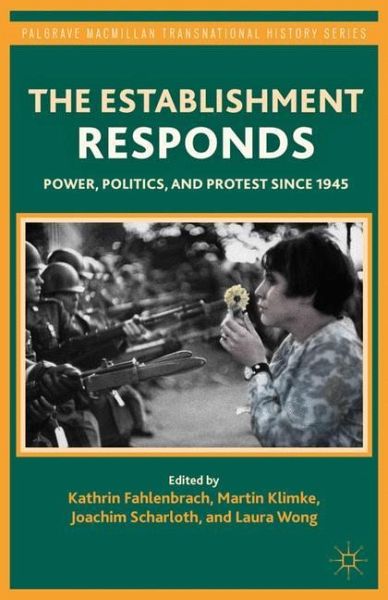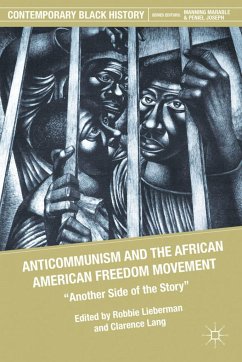
Broschiertes Buch
The Establishment Responds
Power, Politics, and Protest since 1945
Herausgegeben: Fahlenbrach, K.; Klimke, M.; Scharloth, J.; Wong, L.
Versandkostenfrei!
Versandfertig in 6-10 Tagen

PAYBACK Punkte
19 °P sammeln!





This volume fills this gap by examining the many ways in which political parties, the business world, foreign policymakers, and the intelligence community experienced, confronted, and even actively contributed to domestic and transnational forms of dissent.
KATHRIN FEHLENBACH teaches media studies at the University of Halle Wittenberg, Germany. MARTIN KLIMKE co-author of the Palgrave titles 1968 in Europe and the forthcoming A Breath of Freedom. He is a Research Fellow at the German Historical Institute in Washington DC, USA. JOACHIM SCHARLOTH co-author of 1968 in Europe and Associate Professor at Dokkyo University in Tokyo, Japan. LAURA WONG works for UNESCO's Bureau of Strategic Planning, where she manages the public-private partnership between UNESCO and Daimler-Chrysler that aims to foster intercultural dialogue among young people.
Produktdetails
- Palgrave Macmillan Transnational History Series
- Verlag: Palgrave Macmillan / Palgrave Macmillan US / Springer Palgrave Macmillan
- Artikelnr. des Verlages: 978-0-230-11499-9
- 2012
- Seitenzahl: 264
- Erscheinungstermin: 7. Februar 2012
- Englisch
- Abmessung: 235mm x 155mm x 15mm
- Gewicht: 454g
- ISBN-13: 9780230114999
- ISBN-10: 0230114997
- Artikelnr.: 34438897
Herstellerkennzeichnung
Palgrave Macmillan
Tiergartenstr. 17
69121 Heidelberg
ProductSafety@springernature.com
'This volume is unique in its sociological, global, and historical approach to the study of social movements. Its systematic effort at analyzing social movements in their widest social and political contexts addresses a real gap in the current literature. Insisting on a cross-disciplinary theoretical lens the volume offers novel insights and opens up new avenues for research on political protest.' - Thomas Olesen, Aarhus University, editor of Power and Transnational Activism
'A very useful contribution to the literature on protest movements.' - Gerd-Rainer Horn, University of Warwick, author of The Spirit of '68: Rebellion in Western Europe and North America, 1956-1976
'This is a cohesive volume with a clear overarching theme. It is highly original in its overall aims and in the delivery in individual chapters. There are other edited volumes in existence which deal either wholly or in part with protest movements, but none of these previous volumes really look directly at establishment responses, so this book fills a real gap in general, and individual chapters make important contributions to particular fields such as civil rights or terrorism.' - Nick Thomas, Department of History, University of Nottingham
'A very useful contribution to the literature on protest movements.' - Gerd-Rainer Horn, University of Warwick, author of The Spirit of '68: Rebellion in Western Europe and North America, 1956-1976
'This is a cohesive volume with a clear overarching theme. It is highly original in its overall aims and in the delivery in individual chapters. There are other edited volumes in existence which deal either wholly or in part with protest movements, but none of these previous volumes really look directly at establishment responses, so this book fills a real gap in general, and individual chapters make important contributions to particular fields such as civil rights or terrorism.' - Nick Thomas, Department of History, University of Nottingham
Für dieses Produkt wurde noch keine Bewertung abgegeben. Wir würden uns sehr freuen, wenn du die erste Bewertung schreibst!
Eine Bewertung schreiben
Eine Bewertung schreiben
Andere Kunden interessierten sich für











